
Albers Brief Spring 2018
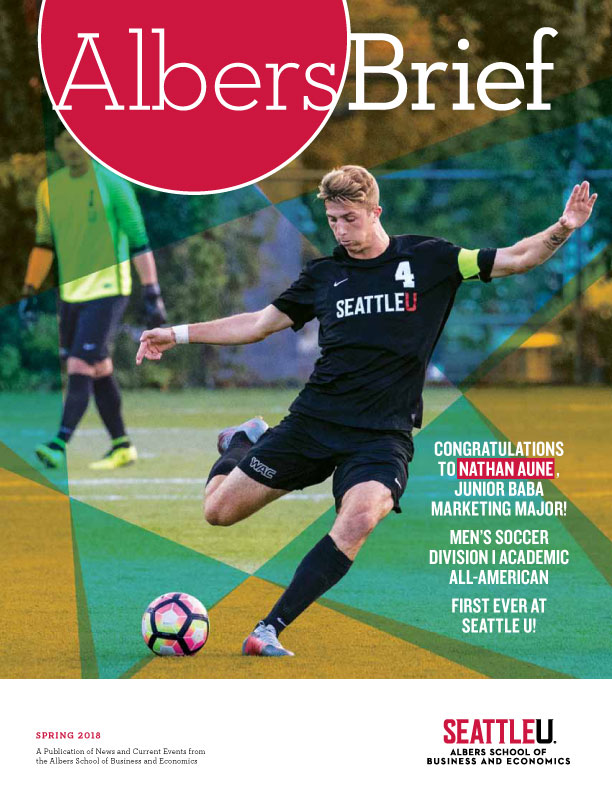
Dean's Message
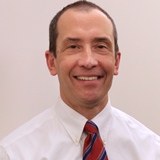
I am having a hard time keeping up with all our anniversaries and celebrations! First, this is the twentieth anniversary year of our Executive Leadership Program. This has proven to be a program with high impact. By the end of this academic quarter, over 500 business and community leaders will have graduated from the program, and they and the organizations they serve have found it to be transformational. They leave the program knowing how a leader can create positive change in organizations and the world.
This is also the 50th anniversary of our MBA program! Many will tell you that MBA programs are struggling, as their value is questioned by some pundits. The trend is for more and more students to opt for specialized graduate degrees in business. But MBA programs with a broad and integrated structure can be extremely valuable. Our
Professional MBA, with its distinctive integrated core curriculum and flexibility, continues to be a compelling option for many students.
Of note about this 50th anniversary is that a former MBA program director, Professor David Carrithers, will be retiring at the end of this academic year. David joined Albers 34 years ago as MBA program director, and went on to serve in a number of roles, but most important for him and the school has been his teaching in the classroom. He has
always been known as a skilled educator, very dedicated to the success of his students! Over the years, many of our alumni have expressed their gratitude for the contributions he made to their education. Be sure to read the story about David on page 10!
Finally, this year the university is celebrating Fr. Stephen Sundborg’s twenty years as president of Seattle University! Fr. Steve is highly regarded both on campus and in the community. He has always been very supportive of the Albers School. As he is fond of saying, and we are fond of hearing, “There is no finer school at SU than the Albers School!” But seriously, Fr. Steve has been an outstanding leader for the university and created a remarkable legacy as our president.
Thank you for your support of the Albers School! Enjoy reading this edition of the Brief!

Joseph M. Phillips
Dean, Albers School of Business and Economics
_____________________
Student Profile: Veronika Zwicke
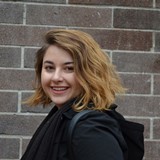
Always On The Go
Peachtree City, Georgia, native Veronika Zwicke had never heard of Seattle University before tagging along with her dad on a business trip to Seattle. It was the beginning of her senior year of high school and she had been looking at colleges in Georgia, but when she came to Seattle, she knew this was the place for her. Although she preferred
a smaller school, Seattle University never came up in her searches. She was “fortunate enough to find it” one day when she and her dad were walking to Dick’s on Broadway. They saw the campus and decided to check it out. “I fell in love with it,” she said.
Zwicke had a graphic design business in high school and competed in Skills USA in advertising design, where in her first year she made it to States and placed 20th in the nation. With that background, she entered Seattle U as a graphic design major, but soon decided she had a greater interest in learning more about business. She transferred to Albers, where she is a senior majoring in marketing and management. Zwicke is very happy she chose Seattle U. In addition to getting a great education, “If I’d gone to a bigger school, there’d be no way I could have accomplished everything I have,” she said. She credits the faculty and staff for being closely involved with the students and helping make what they want to do achievable.
Strongly believing “if you don’t get yourself involved on campus, you’re wasting your money,” Zwicke has engaged in some of the many opportunities available to students and created some of her own. In addition to working as a New Student Mentor for the last two years, Zwicke has worked in Public Safety for three years as the van rental and transportation guru. She is in her third year as president of the American Marketing Association at Albers which, for a long time, included using her graphic design skills to
create all the posters and flyers for the group. She’s brought an impressive lineup of speakers to campus and has stayed in touch with each of them. She has also been the student representative on the Curriculum and Academic Policy Committee (CAPCOM) in Albers this year.
As if that were not enough to keep her busy, Zwicke created and leads Canisius Designs, a student-run design agency under the auspices of the American Marketing Association. With a focus on fulfilling the Jesuit mission of helping others, this enterprise provides marketing assistance to students across campus who can’t afford to pay for these services. Zwicke started the company as a way to bridge the gap between business and graphic design students. She saw that graphic artists were doing projects in class but weren’t getting real-life experience; business students were doing real-world projects but not working with anyone outside the business world. There is no charge for their services and the students who work there don’t get paid, but they get great experience to put on their resumes. Zwicke’s hope is to expand their offerings to others
across campus as well as to nonprofits with limited budgets.
Zwicke’s goal after graduation is to work in social media marketing. She’s been involved in social media since middle school, starting out on Facebook and progressing to other platforms. Her current favorite is Snapchat, where she gets her news and keeps in touch with her family. Zwicke also has a food blog. She loves to bake and likes to make new recipes. She goes to the Capitol Hill Farmer’s Market every week and throws lots of dinner parties.
Longer term, Zwicke sees herself progressing to a high level in a marketing department, but not being a CEO. “I don’t have the patience for that,” she said. Another option is to drop her marketing goals and open a bakery. “Ultimately, I think I would be happiest doing marketing on the side and have a little bakery,” she mused.
____________________
Albers Faculty Research News

Misuk Lee’s (Assistant Professor of Management) article, “Modeling and forecasting hotel room demand based on advance booking information,” has been accepted for publication in Tourism Management.
Sherry Sun’s (Lecturer in Information Systems) article, “How High Should We Go? Determining Reservation Values to Negotiate Successfully for Composite Software Services,” co-authored with Jing Zhao (City University of Hong Kong) and Sumit Sarkar (University of Texas—Dallas), has been published in Information Systems Research.
Nathan Colaner (Instructor in Management), Jessica Imanaka (Associate Professor of Management), and Greg Prussia (Professor of Management) have had their paper, “Dialogic Collaboration across Sectors: Partnering for Sustainability,” accepted for publication in Business and Society Review.
Claus Portner's (Assistant Professor of Economics) article, “Income Shocks, Contraceptive Use, and Timing of Fertility,” co-authored with Shamma Alam (Dickinson College), has been accepted for publication by the Journal of Development Economics.
Ajay Abraham (Assistant Professor of Marketing) and Matt Isaac (Associate Professor of Marketing) have had their article, “Implementing the Challenger Sales Model at Cars.com: A Case Study,” co-authored with Elaine Richards, EVP of Business Operations, Cars.com, accepted for publication by the Journal of Business and Industrial Marketing.
Jennifer Marrone’s (Associate Professor of Management) article, “Humility: Our Current Understanding of the Construct and its Role in Organizations,” co-authored with Albers alum Rob Nielsen, has been accepted for publication in the International Journal of Management Reviews.
Quan Le’s (Associate Professor of Economics) paper, “The Case of Café Ambiental, SPC: A New Business Model for a Nicaraguan Fair Trade Cooperative,” coauthored with Braden Wild (Albers senior) and Sue Jackels (College of Science and Engineering), has been accepted for publication in World Development Perspectives.
Katie Fitzpatrick (Associate Professor of Economics) has had her article, “Bank Accounts, Non-bank Financial Transaction Products, and Food Insecurity Among Households with Children,” accepted for publication in the Journal of Consumer Affairs.
Katya Emm (Associate Professor of Finance) and Ruben Trevino (Professor of Finance) have had their paper, “Risk and Investment Horizon: Is Time Really Money?” accepted for publication by the Journal of Investing.
Ben Kim’s (Professor of Management) article, “Analysis of Big Data to Locate Factors for Flight Delays using Machine Learning Algorithms,” co-authored with Albers PMBA students Ankush Hakhoo, Sambhav Luhadia, and Anh Pham, has been accepted for publication by the Journal of Information and Management.
Sarah Bee (Senior Instructor in Accounting) and Gabe Saucedo’s (Assistant Professor of Accounting) article, “Accounting Conversations: A Case Study in Auditor Communications,” co-authored with Iram Jafry (PMBA alumna), was accepted for publication by the Review of Business. The manuscript previously received a Best Paper Award at the 2017 Global Business Research Symposium in Cork, Ireland in July, 2017.
Stacey Jones’ (Senior Instructor in Economics) article, “The Influence of Service-Learning on the Civic Attitudes and Skills of Japanese Teacher Education Candidates,” co-authored with Jeffrey Anderson (College of Education) and Takeshi Miyazaki (Soka University, Japan), has been accepted for publication in the International Journal of Research in Service Learning in Teacher Education.
Bill Weis’ (Professor of Management) article, “‘Laudato Si’ and the Consumption Challenge: Giving Students a Visceral Exercise in Saving our Planet,” coauthored with Susan Jacobson and Abigail Schneider (both at Regis University), has been accepted for publication in Jesuit Higher Education: A Journal.
Erin Vernon’s (Assistant Professor of Economics) article, “The Sustained Impact of Teacher Encouragement on Elementary Students’ Vegetable Snack Consumption: Initial Findings from a Wisconsin Study,” co-authored with Eric Jamelske (University of Wisconsin—Eau Claire), has been accepted for publication in the Journal of Child Nutrition and Management.
Meena Rishi (Professor of Economics) and Chips Chipalkatti’s (Professor of Accounting) paper, “‘Laudato Si’ and the Papal View of Ecological Debt: An Empirical Exploration,” co-authored with Lita Lobo (MSBA student), has been accepted for publication by the Journal of Management for Global Sustainability.
Sarah Bee’s (Senior Instructor in Accounting) article, “The Lemonade Stand: An Elementary Case for Introducing Data Analytics,” co-authored with Bradley Schafer (Kennesaw State University) and Margaret Garnsey (Siena College), has been accepted for publication in the AIS Educator’s Journal.
Gabe Saucedo’s (Assistant Professor of Accounting) paper, “Disclosure and Audit Implications of Nonfinancial Measures: A Teaching Case,” co-authored with Matthew Hoag (Gonzaga University), was accepted for publication by Current Issues in Auditing. The manuscript previously won Best Paper Award at the American Accounting Association Western Region Meeting in April, 2017.
____________________
Milestones At Albers

Albers is reaching two big milestones during the 2017-18 academic year. This is the 50th anniversary of the MBA program (now called the Professional MBA). It is also the 20th anniversary of the Executive Leadership Program (ELP), which was the first Executive Education course at Albers.
50 Years of MBA
The MBA program was started in 1967 by Dean Jim Robertson, who had recently arrived from Santa Clara University. A selling point of his candidacy for dean was the idea
of adding a part-time MBA program at Seattle University, which he began immediately. It was modeled after the program at Santa Clara, featuring foundation courses for students without business training. The program was part-time from the start, with working professionals the target audience. The MBA was an immediate success. The
breakeven goal was 100 students; first year enrollment was 200, a majority of whom were engineers from Boeing. The Albers MBA was accredited by the Association to Advance College Schools of Business (AACSB) in 1980.
The MBA was the first graduate program at Albers. Based on its success, we introduced additional part-time master programs, dual degrees, and graduate certificates, but it wasn’t until 2006 that another MBA degree, the Leadership Executive MBA (LEMBA), was launched. The Bridge MBA, a full-time, one year program for nonbusiness majors was added in 2013.
The Professional MBA program is nationally ranked by U.S. News and World Report, Bloomberg BusinessWeek, and The Princeton Review. It is also consistently ranked
among the top graduate business programs in the Northwest.
20 Years of Excellence in Leadership: Executive Leadership Program (ELP)
The Executive Leadership Program (ELP) was launched in 1997 as an interdisciplinary effort to provide what was typically missing in leadership development programs for experienced corporate leaders — a focus on values, ethics, and social responsibility. Under the sponsorship of Linda Hanson, VP for Seattle University’s University Development Office, input was gathered from several Puget Sound business partners, including Costco Wholesale; Eddie Bauer, LLC; Weyerhaeuser Co.; and the Boeing
Company. Executives from Safeco Insurance and Port of Seattle joined with Seattle University faculty and administration in curriculum design. Under its first program director, Dr. Marianne LaBarre, the Executive Leadership Program graduated its inaugural class in 1998 and earned a committed following.
Dr. Marilyn Gist has led the refinement and expansion of executive programs, including the ELP program, since 2003. Notably, the community service project was shifted from focusing on charity to emphasizing social justice in a course entitled, “Leadership for a Just and Humane World.” In addition, business executives have been guided in leadership formation, inspired by the process of discernment and action for others championed in Jesuit teaching. The Leadership Executive MBA (LEMBA) was created
in 2006, incorporating ELP as its foundation. Concurrently, the Center for Leadership Formation was created to administer the University’s executive education offerings.
At 20 years, the Executive Leadership Program boasts over 500 alumni representing over 200 businesses, who are influential business leaders with significant societal impact felt around the globe. The formative role this program plays in executive development remains at the core of the Albers Leadership Executive MBA, which has ranked #12 in the nation for the past two years by U.S. News and World Report. The latest rankings for 2019 have just been released and this excellent program moved up to #11 in the country.
____________________
Albers Executive Speaker Series

PIZZA AS A PLATFORM FOR SOCIAL IMPACT
SCOTT & ALLY SVENSON
CO-FOUNDERS, MOD PIZZA
Husband and wife team Scott and Ally Svenson had started two highly successful businesses prior to opening their first MOD Pizza restaurant in 2008. The Svensons had their first experience in retail while living in London. Having both grown up in Seattle with Starbucks, Ally realized she was missing the quality coffee experience she had enjoyed. Even though they had no experience in retail, they ended up starting Seattle Coffee Company in 1994. In 1998, they sold the company to Starbucks as its entry into the European market.
After a second foray into the restaurant business in London with a successful, award-winning Italian deli-café, the Svensons moved back to Seattle to raise their sons. They had no intention of getting back into the “fickle” restaurant and retail markets, but someone suggested they look at the pizza industry. After extensive research, they found that the pizza industry was enormous, but had “a shocking lack of innovation over the last 35 years,” Scott said. This was in contrast to the bulk of the restaurant industry, which had tremendous innovation, particularly within the fast, casual service format. They decided to open MOD Pizza as a fast, casual restaurant. They continued to work on how to scale the business even as they were opening new stores, using the mantra “Trying to fail fast.” When the Svensons realized they weren’t failing and this was a true opportunity, they started investing in the infrastructure and people. They have grown from 14 stores to 265 over the last four years and, for the past two years, have
been the fastest growing restaurant in the U.S. They are now expanding internationally.
The Svensons also wanted to build a business with positive social impact. They took some hiring risks with people early on “who we thought could use a fresh start and needed somebody to believe in them,” said Ally. “The culture that developed at MOD was incredible to us,” she said. Some of the at-risk hires were “pouring their heart
and soul” into their work and had an incredible work ethic. They consider themselves a purpose-led organization with a focus on people. They no longer open a store without partnering with a local nonprofit. Their growth has been encouraged by their employees so they can give more opportunities to others.
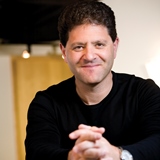
POLITICAL POLARIZATION AND ECONOMIC INEQUALITY: AMERICA AT A CROSSROAD
NICK HANAUER
ENTREPRENEUR, VENTURE CAPITALIST, ACTIVIST, PHILANTHROPIST, AUTHOR
Political polarization is a recent “thing” in our country, according to Nick Hanauer, co-founder and partner in Second Avenue Partners, a venture capital firm. He sees it as a breakdown in social cohesion. According to recent polling by David Simas, CEO of the Obama Foundation, Americans now identify other Americans as the greatest threat to America, which is a relatively recent phenomenon. In Hanauer’s opinion, “This breakdown in social cohesion is the core reality of our economics and politics today. People
are getting screwed. There is no other way to say it and it’s unambiguously true.” People are very angry at different people for different reasons, but he feels the anger is justified. He believes that we have been taken advantage of for the last 40 years.
The cause of this situation is based in economics. At a macro level, wages fell from 52% to 46% as a percentage of GDP since 1980, while profits rose from 5% to 11% as a percentage of GDP. If you look at income distribution, the top 1% of Americans shared about 8% of the national income in 1980, in contrast to about 22-23% in 2016-17. The wages of the bottom 50% of Americans have fallen from around 18% of national income to around 12%. “At the same time,” said Hanauer, “the costs of living a dignified middle class life have gone parabolic.” He sees the reason for this as very simple: in a market economy such as ours, the people with the most money bid up the price of things that other people want to buy. As a result, the price of housing, education, and healthcare have risen much faster than wages.
So why and how did this happen? Hanauer believes that we caused this outcome by accepting a set of ideas about how the economy works, based on the contention that people are rational calculators of self-interest, markets are perfectly efficient, and people have reasonable expectations. Therefore, the rich deserve to be rich and the poor deserve to be poor. This developed into the theory of “trickledown economics.” Hanauer describes it as the belief that the economy benefits broadly from tax cuts to the
rich, deregulation for powerful people, and wage suppression for everyone else. “The interesting thing” he said, “is there is zero empirical evidence for those claims.”
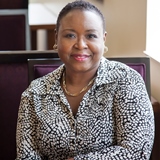
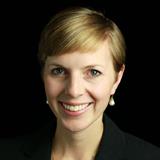
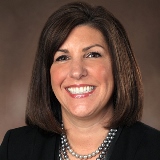

DIVERSITY AND EQUITY IN THE CORPORATE SECTOR
A Panel Discussion moderated by Albers Associate Professor Holly Ferraro with panelists:
Margy Elliot
MarComm for Global Diversity and Inclusion Organization, Amazon
Denise Merle
SVP of Human Resources and Information Technology, Weyerhaeuser
Laura Swapp
Director of Multicultural Marketing and Brand Partnerships, REI
Companies differ in their use of terms to define ‘diversity’ and ‘inclusion,’ with some not using those words at all in their strategies. The intent, however, of ‘For All’ seems to be the common thread of their approaches. The purpose is to recognize that people are unique and possess multiple dimensions, such as gender, race, sexual orientation, disability status, and more. They are focusing on hiring, developing, and retaining a diverse population and diverse leadership.
While some companies have been ending their use of affinity groups in favor of inclusion councils, affinity groups can be a very powerful way of connecting with peers in a large company. The general agreement was that affinity groups work best if they are started by the employees. Amazon has nine affinity groups, with 25,000 members around the world. They have provided ideas, advice, and support for their members, as well as for the company. At Weyerhaeuser, affinity groups faded over the past few
years, but a leadership development group of next generation employees recommended they be revitalized and connected to the business groups, while also creating an inclusion council. REI does not have affinity groups, not because there is a policy against them, but because the environment there hasn’t generated the need for them.
They may find a need for them in the future.
All panelists agreed that the conversations that need to take place around diversity policies, definitions, and strategies are difficult ones. The ultimate goal is to create an environment that is safe and comfortable for all. But do we really have to make everyone comfortable? Maybe the goal is to be comfortable being uncomfortable. One
thing, however, that each company represented enforces is a zero tolerance policy toward abuse or harassment of any kind. That is not to say that you will be escorted out for making a mistake, but each one feels that its parameters are clear and integrity is key. Intent is an important factor, but even good intentions do not always outweigh the
core responsibility of a person’s job.
____________________
Alumni Profile: Michael Schwartze
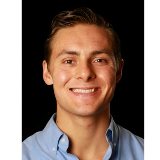
Pursuing His Passion For Sports
Albers alum Michael Schwartze (’16 economics and finance double major) landed his dream job in a very competitive industry 18 months after graduating from Seattle
University. The journey he took to being an analyst in the Baseball Operations department for the San Francisco Giants was focused and disciplined.
Schwartze had always had a passion for sports and decided in high school that he wanted to pursue a career in baseball. He knew he wasn’t going to play baseball in college, so he concentrated on learning about the sport from other perspectives. Knowing of a large community of bloggers who write about baseball analytics, Schwartze read extensively about it and then increased his writing on the subject to get experience thinking about the game more critically.
Schwartze planned his college career around preparing himself with the tools that would be applicable to baseball, but also for other opportunities if that goal didn’t work out. Originally looking at various cities on the west coast, he narrowed his college search to schools in Seattle. He grew up in Tacoma and had a level of comfort and familiarity with the area. In choosing Seattle University, the deciding factor for him was the smaller class size and environment of Seattle U.
Choosing his major was a bit more challenging. “There is no baseball or sports analytics major,” Schwartze said. Conducting extensive research on the backgrounds of people in the industry, he found economics to be common to many of them. He also chose finance as a major to get exposure to numbers and thinking critically. Although he didn’t major in economics for the quantitative tools, Schwartze liked what he experienced as “the shift in the Albers Economics Department to be more quantitative.” Those classes really pushed him and gave him great tools to succeed in baseball, as well as many other industries.
Although he was focused on developing skills that would help him in his chosen career, Schwartze also enjoyed the qualitative side of his education. He liked both the business and nonbusiness core classes and learned how to read and think critically on a variety of subjects.
In addition to targeting his studies for his chosen profession, Schwartze worked as a student manager with the Seattle U baseball program. He was able to learn how a college program looks at the game from a development standpoint. He helped with the videos, statistical reporting, and many other tasks. “I also did a lot of laundry over my four years!” he exclaimed. It was a huge opportunity for him and he knew it would differentiate him from other candidates when the time came. Schwartze had the opportunity to
work as an assistant scout for a baseball team in the Northwest for all four years of school. It was an unpaid position, but another way to get his foot in the door. He went to a lot of the games, met people, networked, and learned how professionals in the business work and think.
Looking to hone his analytical skills with professional experience, Schwartze interned with Amazon as a financial analyst in the Kindle group for six months. He liked the group and valued the experience he was getting, so he continued with Amazon when school was over. Finances and timing both played a role in his decision. Working at Amazon gave him the opportunity to pay back his student loans and save some money before entering an industry where starting salaries are lower. In addition, baseball teams do most of their hiring at the end of the fourth quarter of the year, so there were no job opportunities in June when he graduated. In the end, his hard work and intentionality paid off. Someone Schwartze met through working with the SU team and the other baseball program submitted his name for the new position with the Giants. “It was a classic example of how networking can help create opportunities,” he said.
____________________
New Center of Excellence Within Albers
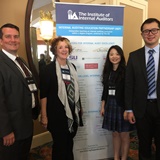
Seattle U’s Internal Audit program, housed in the Albers School of Business and Economics, has been designated a Center of Excellence by the Institute of Internal Auditors within its Internal Auditing Education Partnership (IAEP) program. The prestigious designation comes after a rigorous application and review process. A select few universities
around the world are recognized as a Center of Excellence. Seattle U is only the eighth school worldwide to achieve this designation and one of five in the country and the first Jesuit and West Coast school to be so named.
Students who earn the program’s Internal Audit certificate are ready to enter the internal audit profession with relevant skills to “hit the ground running.” Students enrolled in the certificate program may take the Certified Internal Audit exam to emphasize their commitment to a career in internal audit and are reimbursed for costs of the exam. “Internal auditors do more than accounting,” said Sarah Bee, senior instructor. “They may perform operational audits in addition to financial audits, which are much broader in scope. Operational audits help you to understand the company and understand risk, which helps the firm achieve its objectives.” Examples include quality assurance measures such as pilot training levels for an airline and efficiency of manufacturing processes, working conditions, and fair wage practices for food sources such
as coffee growers.
According to the IAEP, Centers for Internal Auditing Excellence are “identified as teaching a curriculum within a college or university degree program that consists of a minimum of four courses related to the internal audit profession (as agreed to between the school and ARC) and equate to a concentration, a minor, or a major within a specific academic discipline. It also recognizes the quality, sustainability, volume of students completing the program, and longevity of the program.”
“This designation has been made possible thanks to a tremendous amount of work by our program director, Sarah Bee, and the Internal Audit Advisory Board, led by Dominique Vincenti, vice president of Internal Audit at Nordstrom,” said Joseph Phillips, dean of the Albers School.
____________________
Faculty Profile: David Carrithers
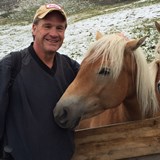
A Huge Contributor To Seattle University
Unbeknownst to many, David Carrithers joined Albers 34 years ago as director of the MBA program. He was finishing his MBA at the University of Washington when his then-wife, who was assistant registrar at Seattle University, became aware of the opening in Albers and encouraged him to apply. “She was so highly respected all I had to do was say I was her husband,” he claims, and he was hired by John Eshelman, dean of Albers at the time. The MBA program (now the Professional MBA) was much smaller then and his department consisted of Carrithers and his assistant, Felicia Gilmour. They did recruiting, promotion (with a $2,000 budget!), met with students, etc. In addition, Eshelman told Carrithers the job required that he also teach classes.
The first class Carrithers taught at Albers was Introduction to Marketing. He had never taught before and he considered himself more of a finance than a marketing person, but decided he could survive by staying a week or two ahead of his students. He quickly discovered that he knew much more than his students, and also realized teaching was in his blood; he was having so much fun. After the first quarter, Carrithers went to Eshelman and asked if he could teach finance instead. And the rest is history.
A couple of years later, Carrithers was asked to be director of Continuing Education for the university. He agreed to the offer with the caveat that he could continue to teach in Albers part time. Amid struggling enrollments across campus, the department was closed four years later and Carrithers happily came back to Albers as a full-time instructor, teaching accounting, statistics, economics, and finance and filling in for leaves of absence and sabbaticals. When Dean Joe Phillips arrived, he made Carrithers
a non-tenure track full-time instructor at Albers.
Carrithers has made many lasting contributions to Seattle University during his time here. He created the GMAT Prep Class and taught it four times a year for 22 years. He was the original program director of the Bridge MBA program, on the board of the Entrepreneurship Center (now the Innovation and Entrepreneurship Center) when it started, on the board of the precursor to the School of Theology and Ministry, and faculty advisor for Beta Gamma Sigma, the business academic honor society. He has also been faculty advisor to the Albers Investment Club and wrote the original proposal to establish the Redhawk Fund. He currently serves as co-chair on the University Assessment Committee.
Growing up in Iowa, Carrithers wanted to be a herpetologist when he was young. He loved snakes and used to collect them as a kid. His first major at Iowa State University was biology. After two months of that, he switched to economics, but it wasn’t for him at the time. He eventually found philosophy “to figure out what was going on in
my life,” he said. “It didn’t help.” It did, however, teach him how to think about things from a different perspective. After college, Carrithers traveled through Europe and the United States with a high school friend and eventually made his way to Palouse, Washington, where his brother was studying for his PhD at Washington State University.
After living there a year “in abject poverty” and having the time of his life, Carrithers moved to Seattle, where he held various jobs before earning his MBA and starting to work at Seattle University.
A talented athlete, Carrithers swam for his high school and college teams. In high school he was a five-time state champion and an All-American. He went to Iowa State University on a full swimming scholarship, but gave it up after a year because he took up handball and was tired of swimming. He does, however, enjoy open water swimming, and competing once a year in Ft. Lauderdale in the YMCA Masters Nationals competition with a group of high school swimming friends.
When he retires at the end of this academic year, Carrithers will be moving to Snohomish with his wife, Marta, whom he married in 2016. He plans to continue his passion for teaching and swimming as a Special Olympics swim coach, along with volunteering (but not acting) at a community theater. Travel is also on the agenda.
____________________
Happening At Albers

ALBERS EXECUTIVE SPEAKER SERIES
Events are held in Pigott Auditorium from
5:30-6:30 p.m. (unless otherwise posted).
Free and open to the public.
Kevin McAllister
President & CEO, Boeing Commercial Airplanes
Thursday, April 19, 2018
Benson Porter
President & CEO, BECU
Tuesday, May 22, 2018
ALBERS PLACEMENT CENTER EVENTS
SU Career and Internship Fair
Tuesday, April 17, 2018
11 a.m.–2 p.m.
Campion Ballroom
Employers will be in attendance to provide more information about job and internship opportunities.
Open to all students and alumni.
Albers Graduate Student Professional Development Night
Wednesday, May 2, 2018
4:30–6:30 p.m.
Casey Commons
An opportunity for current Albers graduate students to connect with alumni, Albers mentors, and business leaders.
Albers Volunteer Recognition Reception
Tuesday, May 22, 2018
4–5:30 p.m.
Sullivan Hall 2nd Floor Lobby
A celebration to honor and thank all Albers advisory board members and mentors for their service.
ALBERS ETHICS WEEK
May 7-11, 2018
A special time when the Center for Business Ethics hosts dozens of guest speakers from the greater Seattle-area business community to appear in Albers classes to discuss a topical, ethical issue with our students.
Public Events are centered on the theme Ethics and Finance: A Decade After Crisis and include:
A Retrospective Examination of the Role of Ethics in Financial Crises
Monday, May 7, 2018
5:30–6:45 p.m.
Stuart Rolfe Community Room,
Admissions and Alumni Building
Panel discussion moderated by Bonnie Buchanan, Howard J. Bosanko Professor, Seattle University.
Panelists to include Michael McMillan, Director of Ethics and Professional Standards, CFA Institute
Light refreshments provided.
The Wisdom of Finance: Discovering Humanity in a World of Risk and Return
Wednesday, May 9, 2018
5:30–6:45 p.m.
Pigott Auditorium
Mihir Desai, Mizuho Financial Group Professor of Finance, Harvard Business School
A public lecture followed by a book signing.
HARRIET STEPHENSON BUSINESS PLAN COMPETITION
Elevator Pitch & Trade Show
Thursday, May 3, 2018
11 a.m. –2 p.m.
Campion Ballroom
The Trade Show is open to the Seattle University community, friends, family, colleagues, and the public.
Final Presentations
Thursday, May 31, 2018
2–5 p.m.
Campion Ballroom
46th ANNUAL ACCOUNTING AWARDS BANQUET
Friday, June 8, 2018
Reception: 5–6 p.m., Campion Tea Garden
Banquet: 6-8 p.m., Campion Ballroom
To RSVP or for more information, please contact Jani Medeiros at medeirj@seattleu.edu.
2018 DOLOMITES PROGRAM: EMOTIONAL INTELLIGENCE IN THE ITALIAN DOLOMITES
September 1-9, 2018
For complete information about this amazing program (in its 16th year!) go to: http://www.pauseconnect.com/dolomites-eq.html. Seattle University alumni are welcome to participate. We waive the application deadline for all alumni, so apply now!
____________________
![]()